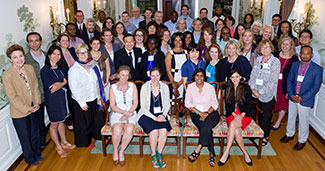
Science of Stigma Reduction: New Directions for Research to Improve Health
The Science of Stigma Reduction: New Directions for Research to Improve Health, a project coordinated by Fogarty's Center for Global Health Studies (CGHS), convenes researchers, policymakers and program implementers from the U.S. and low- and middle-income countries (LMICs) who focus on reducing health-related stigma across disease areas, populations and settings.
Stigma Research Training Institute - June 2020
CGHS will host a short-term Stigma Research Training Institute June 8-11, 2020 in Bethesda, Maryland. The training will promote transdisciplinary and novel health-related stigma research methods to a cohort of researchers from diverse fields to strengthen research capacity in this area. Participation in the Institute is by application only. Accepted trainees will receive travel scholarships (including airfare), accommodation, and a per diem. Applications for participation are due February 10, 2020.
Apply to participate in the 2020 Stigma Research Training Institute through CRDF Global.
Science of Stigma Reduction Workshop - June 2017
In June 2017, CGHS hosted the workshop The Science of Stigma Reduction: New Directions for Research to Improve Health" at NIH. The 3-day event convened U.S. and LMIC researchers, policymakers and program implementers, with a focus on reducing health-related stigma.

Courtesy of NIH Medical Arts / Thinkstock
An article collection published in BioMed Central resulting from the workshop details case studies, articulates lessons learned, illustrates partnership strategies and sets forth key research priorities. The workshop also expects to inform NIH investments and lay the groundwork for new partnerships. It has already informed a newly established Fogarty program, Reducing Stigma to Improve HIV/AIDS Prevention, Treatment and Care in LMICs.
Context
Stigma is a major cause of discrimination in health care settings across the globe. Stigmatized individuals can be excluded from effective or quality treatment and care, and may be subject to human rights abuses, which in turn can lead to risky health care seeking behavior. Both public stigma and self-stigma can play substantial roles in how health services are sought, accessed and delivered for many diseases and conditions. Stigmatizing attitudes often stem from fear due to a lack of knowledge about a particular disease or illness - a problem that can be exacerbated in LMICs.

Photo courtesy of NIH
Researchers, policymakers and program implementers
gathered at NIH for The Science of Stigma Reduction.
gathered at NIH for The Science of Stigma Reduction.
In 2001, Fogarty launched the Stigma and Global Health Research program with partners across NIH and the U.S. government, and convened a corresponding international conference. Fogarty's Global Brain Disorders Research program currently encourages stigma-related research. Other Institutes and Centers across NIH have issued funding opportunity announcements on assessing the role of and reducing stigma.
Partners
The following entities at NIH are partners on the project:
- National Institute of Mental Health (NIMH)
- NIH Office of the Director
- NIH Sexual and Gender Minority Research Office (SGMRO)
- NIH Office of Behavioral and Social Sciences Research (OBSSR)
- National Cancer Institute (NCI)
- National Institute on Drug Abuse (NIDA)
- National Institute of Neurological Disorders and Stroke (NINDS)
- National Institute on Alcohol Abuse and Alcoholism (NIAAA)
- National Institute of Nursing Research (NINR)
Inquiries
Arianne Malekzadeh, M.A.
Global Health Research and Policy Analyst (Contractor)
Fogarty Division of International Science Policy, Planning and Evaluation
Email: arianne.malekzadeh@nih.gov
Global Health Research and Policy Analyst (Contractor)
Fogarty Division of International Science Policy, Planning and Evaluation
Email: arianne.malekzadeh@nih.gov
Updated January 2020































No hay comentarios:
Publicar un comentario